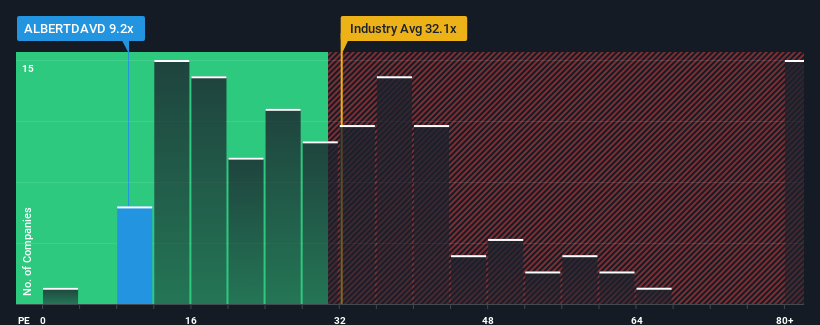Positive Sentiment Still Eludes Albert David Limited (NSE:ALBERTDAVD) Following 25% Share Price Slump
Albert David Limited (NSE:ALBERTDAVD) shares have retraced a considerable 25% in the last month, reversing a fair amount of their solid recent performance. Still, a bad month hasn't completely ruined the past year with the stock gaining 98%, which is great even in a bull market.
Following the heavy fall in price, Albert David may be sending very bullish signals at the moment with its price-to-earnings (or "P/E") ratio of 9.2x, since almost half of all companies in India have P/E ratios greater than 29x and even P/E's higher than 54x are not unusual. Although, it's not wise to just take the P/E at face value as there may be an explanation why it's so limited.
With earnings growth that's exceedingly strong of late, Albert David has been doing very well. One possibility is that the P/E is low because investors think this strong earnings growth might actually underperform the broader market in the near future. If you like the company, you'd be hoping this isn't the case so that you could potentially pick up some stock while it's out of favour.
Check out our latest analysis for Albert David

Does Growth Match The Low P/E?
There's an inherent assumption that a company should far underperform the market for P/E ratios like Albert David's to be considered reasonable.
Taking a look back first, we see that the company grew earnings per share by an impressive 81% last year. The strong recent performance means it was also able to grow EPS by 473% in total over the last three years. So we can start by confirming that the company has done a great job of growing earnings over that time.
Weighing that recent medium-term earnings trajectory against the broader market's one-year forecast for expansion of 24% shows it's noticeably more attractive on an annualised basis.
In light of this, it's peculiar that Albert David's P/E sits below the majority of other companies. It looks like most investors are not convinced the company can maintain its recent growth rates.
What We Can Learn From Albert David's P/E?
Albert David's P/E looks about as weak as its stock price lately. It's argued the price-to-earnings ratio is an inferior measure of value within certain industries, but it can be a powerful business sentiment indicator.
Our examination of Albert David revealed its three-year earnings trends aren't contributing to its P/E anywhere near as much as we would have predicted, given they look better than current market expectations. There could be some major unobserved threats to earnings preventing the P/E ratio from matching this positive performance. It appears many are indeed anticipating earnings instability, because the persistence of these recent medium-term conditions would normally provide a boost to the share price.
You always need to take note of risks, for example - Albert David has 1 warning sign we think you should be aware of.
Of course, you might also be able to find a better stock than Albert David. So you may wish to see this free collection of other companies that have reasonable P/E ratios and have grown earnings strongly.
New: Manage All Your Stock Portfolios in One Place
We've created the ultimate portfolio companion for stock investors, and it's free.
• Connect an unlimited number of Portfolios and see your total in one currency
• Be alerted to new Warning Signs or Risks via email or mobile
• Track the Fair Value of your stocks
Have feedback on this article? Concerned about the content? Get in touch with us directly. Alternatively, email editorial-team (at) simplywallst.com.
This article by Simply Wall St is general in nature. We provide commentary based on historical data and analyst forecasts only using an unbiased methodology and our articles are not intended to be financial advice. It does not constitute a recommendation to buy or sell any stock, and does not take account of your objectives, or your financial situation. We aim to bring you long-term focused analysis driven by fundamental data. Note that our analysis may not factor in the latest price-sensitive company announcements or qualitative material. Simply Wall St has no position in any stocks mentioned.
About NSEI:ALBERTDAVD
Albert David
Manufactures and trades in pharmaceutical formulations, infusion solutions, herbal dosage forms, and bulk drugs in India and internationally.
Adequate balance sheet with slight risk.
Market Insights
Community Narratives




